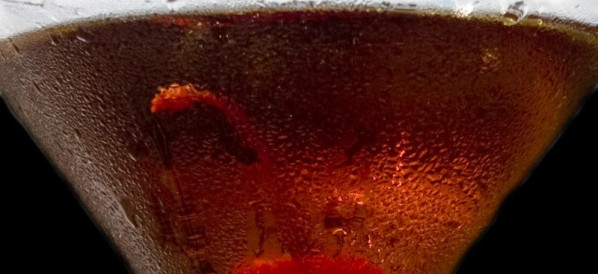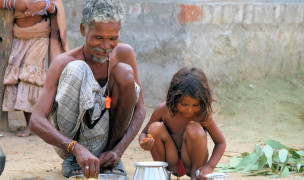 20 Terms
20 TermsHome > Terms > English (EN) > chicken
chicken
History tells us that today's chickens are descendants of wild fowl that roamed the dense jungles of primeval Asia. Thousands of years later, France's King Henry iv stated in his coronation speech that he hoped each peasant in his realm would have "a chicken in his pot every Sunday" (a quote later paraphrased by President Herbert Hoover). It surprises many people that chicken wasn't always the reasonably priced meat it is today. Until after World War ii, only the affluent (and chicken farmers) could manage even the proverbial Sunday chicken. Today, thanks to modern production methods, almost anyone can afford this versatile fowl, which provides not only meat and eggs but feathers as well. Chickens fall into several classifications. The broiler-fryer can weigh up to 3 1/2 pounds and is usually around 2 1/2 months old. These chickens, as the name implies, are best when broiled or fried. The more flavorful roasters have a higher fat content and therefore are perfect for roasting and rotisserie cooking. They usually range between 2 1/2 and 5 pounds and can be up to 8 months old. Stewing chickens (also called hens, boiling fowl and just plain fowl) usually range in age from 10 to 18 months and can weigh from 3 to 6 pounds. Their age makes them more flavorful but also less tender, so they're best cooked with moist heat, such as in stewing or braising. A capon is a rooster that is castrated when quite young (usually before 8 weeks), fed a fattening diet and brought to market before it's 10 months old. Ranging from 4 to 10 pounds, capons are full-breasted with tender, juicy, flavorful meat that is particularly suited to roasting. Rock Cornish hen, also called Rock Cornish game hen, is a hybrid of Cornish and White Rock chickens. These miniature chickens weigh up to 2 1/2 pounds and are 4 to 6 weeks old. Because of the relatively small amount of meat to bone, each hen is usually just enough for one serving. Rock Cornish hens are best broiled or roasted. Squab Chicken (poussin in French), different from the true squab, is a very small, 4- to 6-week-old chicken that weighs no more than 1 1/2 pounds. These tiny birds are best broiled, grilled or roasted. The cock or rooster is an older bird and therefore rather tough. It's best used in soups or to make broths. Free-range chickens are the elite of the poultry world in that, in contrast to the mass-produced birds allotted 1 square foot of space, each range chicken has double that area indoors plus the freedom to roam outdoors. They're fed a special vegetarian diet free (according to most range chicken breeders) of antibiotics, animal byproducts, hormones and growth enhancers. The special diet and freedom of movement is thought by some to give this fowl a fuller, more "chickeny" flavor; the added amenities also make these birds much more expensive than mass-produced chickens. Free-range chickens average 4 1/2 pounds and are usually around 10 to 12 weeks old. Chicken grades: The government grades chicken quality with USDA classifications A, B and C. The highest grade is A, and is generally what is found in markets. Grade B chickens are less meaty and well finished; grade C is usually reserved for scrawny turkeys. The grade stamp can be found within a shield on the package wrapping, or sometimes on a tag attached to the bird's wing. Chicken is available in markets throughout the year either fresh or frozen, and whole or cut into parts. The neck and giblets (liver, gizzard and heart) are either packaged separately and placed in a whole bird's body cavity, or sold individually. Choose a meaty, full-breasted chicken with plump, short legs. The skin — which can range from cream-colored to yellow, depending on the breed and the chicken's diet — should be smooth and soft. Avoid chickens with an off odor, or with skin that's bruised or torn. Store chicken in the coldest part of the refrigerator. If packaged tightly in cellophane, loosen packaging or remove and loosely rewrap chicken in waxed paper. Remove any giblets from the body cavity and store separately. Refrigerate raw chicken up to 2 days, cooked chicken up to 3 days. For maximum flavor, freeze raw chicken no longer than 2 months, cooked chicken up to a month. Salmonella bacteria are present on most poultry (though only about 4 percent of salmonella poisonings are chicken-related). To avoid any chance of bacterial contamination, it's important to handle raw chicken with care. The first rule is never to eat chicken in its raw state. After cutting or working with raw chicken, thoroughly wash utensils, cutting tools, cutting board and your hands. Cook boneless chicken until the internal temperature is 179°F, bone-in chicken to 180°F. Don't let any raw juice come in contact with cooked chicken. The versatile chicken can be prepared in almost any way imaginable, including baking, broiling, boiling, roasting, frying, braising, barbecuing and stewing. Boning chicken will shorten any cooking time but will also slightly diminish the flavor. Chicken is an excellent source of protein, and a good to fair source of niacin and iron. White meat and chicken without skin have fewer calories.
- Part of Speech: noun
- Synonym(s):
- Blossary:
- Industry/Domain: Culinary arts
- Category: Cooking
- Company: Barrons Educational Series
- Product:
- Acronym-Abbreviation:
Other Languages:
Member comments
Terms in the News
Billy Morgan
Sports; Snowboarding
The British snowboarder Billy Morgan has landed the sport’s first ever 1800 quadruple cork. The rider, who represented Great Britain in the 2014 Winter Olympics in Sochi, was in Livigno, Italy, when he achieved the man-oeuvre. It involves flipping four times, while body also spins with five complete rotations on a sideways or downward-facing axis. The trick ...
Marzieh Afkham
Broadcasting & receiving; News
Marzieh Afkham, who is the country’s first foreign ministry spokeswoman, will head a mission in east Asia, the state news agency reported. It is not clear to which country she will be posted as her appointment has yet to be announced officially. Afkham will only be the second female ambassador Iran has had. Under the last shah’s rule, Mehrangiz Dolatshahi, a ...
Weekly Packet
Language; Online services; Slang; Internet
Weekly Packet or "Paquete Semanal" as it is known in Cuba is a term used by Cubans to describe the information that is gathered from the internet outside of Cuba and saved onto hard drives to be transported into Cuba itself. Weekly Packets are then sold to Cuban's without internet access, allowing them to obtain information just days - and sometimes hours - after it ...
Asian Infrastructure Investment Bank (AIIB)
Banking; Investment banking
The Asian Infrastructure Investment Bank (AIIB) is an international financial institution established to address the need in Asia for infrastructure development. According to the Asian Development Bank, Asia needs $800 billion each year for roads, ports, power plants or other infrastructure projects before 2020. Originally proposed by China in 2013, a signing ...
Spartan
Online services; Internet
Spartan is the codename given to the new Microsoft Windows 10 browser that will replace Microsoft Windows Internet Explorer. The new browser will be built from the ground up and disregard any code from the IE platform. It has a new rendering engine that is built to be compatible with how the web is written today. The name Spartan is named after the ...
Featured Terms
Manhattan
What the Martini is to gin, the Manhattan is to whiskey. Traditionally this cocktail is made with rye whiskey or bourbon, and often Canadian whisky ...
Contributor
Featured blossaries
Silentchapel
0
Terms
95
Blossaries
10
Followers
Paintings by Hieronymus Bosch
 20 Terms
20 Terms
Browers Terms By Category
- Biochemistry(4818)
- Molecular biology(4701)
- Microbiology(1476)
- Ecology(1425)
- Toxicology(1415)
- Cell biology(1236)
Biology(22133) Terms
- Advertising(244)
- Event(2)
Marketing(246) Terms
- SSL certificates(48)
- Wireless telecommunications(3)
Wireless technologies(51) Terms
- Algorithms & data structures(1125)
- Cryptography(11)
Computer science(1136) Terms
- Fiction(910)
- General literature(746)
- Poetry(598)
- Chilldren's literature(212)
- Bestsellers(135)
- Novels(127)




